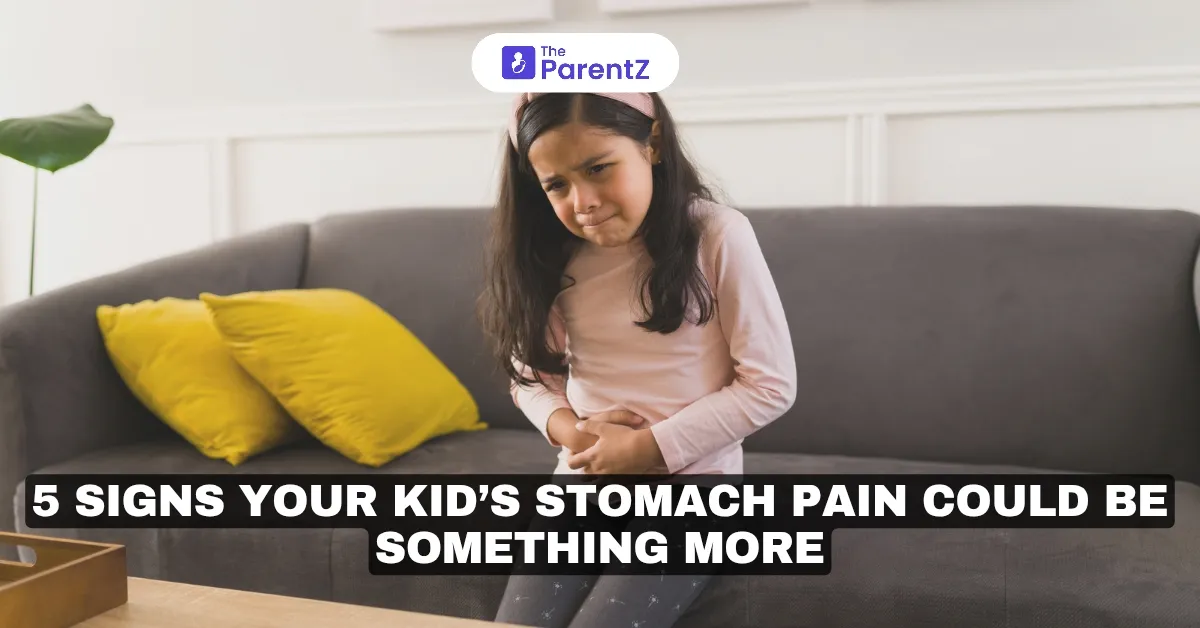The fact is— every parent must have heard their kids saying, ‘My stomach hurts!’, perhaps a dozen times.
In most cases, stomach pain in kids is nothing more than mild indigestion, gas, or hunger.
However, sometimes, it could really be a sign of something more serious. Most parents often make the mistake of assuming that the pain will pass with some rest or certain home remedies, there are moments when a stomachache may require medical attention.
In fact, according to a study, about 10-15 percent of kids experience recurring abdominal pain that points towards an underlying health issue.
The main question is— how do you tell if something is really wrong? Here are five warning signs that may indicate your child’s stomach pain certainly needs to be paid attention to.
The Pain is Severe and Persistent
A mild stomachache that comes and goes is usually nothing to worry about. However, if your child is clutching their belly, crying, or is unable to move without discomfort, the pain could be something more serious.
Intense or persistent pain lasting more than two hours could even indicate an intestinal blockage known as appendicitis.
It often starts as mild discomfort near the belly button but quickly turns into severe pain in the lower right side of the abdomen.
If left untreated, it can lead to a medical emergency.
Accompanied by Vomiting, Fever, or Weight Loss
If stomach pain comes with other symptoms, such as vomiting, fever, or weight loss, it is another red flag. Vomiting with severe stomach pain unusually indicates conditions such as Gastroenteritis, or food poisoning.
Besides, a high fever, typically above 101°F, together with stomach pain, can also be a sign of a kidney infection or bacterial gastroenteritis.
Moreover, if you notice your child has been losing weight unexpectedly and has frequent stomach pain, it could possibly be inflammatory bowel disease (IBD) or celiac disease.
Blood in Stool or Vomit
Bright red blood in stool or vomit is something that should never be ignored. Blood in stool could point to an anal fissure, and dark red or black stools may indicate internal bleeding from the stomach or intestines.
Bloody vomit, however, results from a stomach ulcer or severe acid reflux. According to a clinical study, stomach ulcers affect about 5-10 percent of kids and can lead to severe complications if untreated. Therefore, if you notice blood in your child’s stool or vomit, consult a doctor immediately.
Pain That Wakes Your Child Up at Night
Generally, a mild stomachache usually fades with rest. However, if your child wakes up in the middle of the night due to intense pain, it is perhaps a serious concern. Chances are, it could be associated with gastroesophageal reflux disease (GERD), ulcers, or intestinal issues such as Crohn’s disease.
Therefore, nighttime pain that occurs frequently in kids should not be ignored.
The Pain Lasts for Weeks or Keeps Coming Back
Yes, occasional stomach pain is totally normal. However, if your child has been frequently complaining of stomach aches over weeks or even months, it is indeed a chronic condition. Irritable bowel syndrome, lactose intolerance, and food allergies are some of the common causes of recurring stomach pain in kids.
If your child’s stomach pain keeps returning, especially after eating certain foods, it is best to consult your pediatrician.
Conclusion
Worrying when your child complains of stomach pain is common for every parent. While most stomach aches are usually harmless, sometimes, it could be a sign of something more. If your child’s pain is severe, persistent, accompanied by vomiting, fever, or weight loss, or involves blood, it is best to consult your healthcare provider to diagnose any underlying issue.






Be the first one to comment on this story.